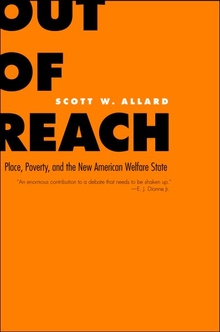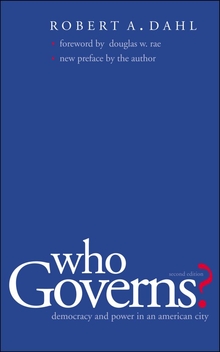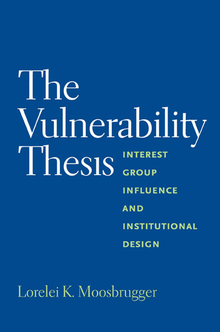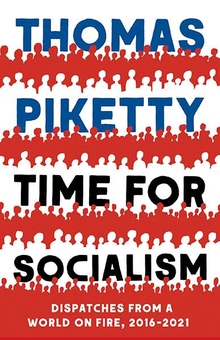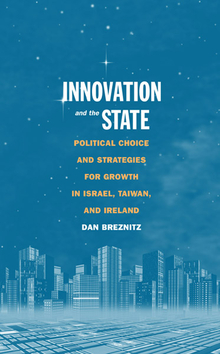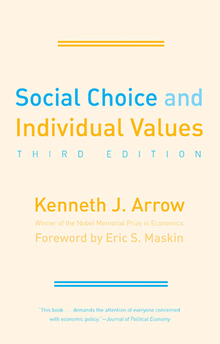Out of Reach
WARNING
You are viewing an older version of the Yalebooks website. Please visit out new website with more updated information and a better user experience: https://www.yalebooks.com
Place, Poverty, and the New American Welfare State
Scott W. Allard
Sweeping changes in welfare programs since 1996 have transformed the way America cares for its poor. Today, for every dollar spent on cash welfare payments, some twenty dollars are spent on service programs targeted at the working poor—job training, adult education, child care, emergency assistance, mental health care, and other social services. This important book examines our current system and the crucial role that geography plays in the system’s ability to offer help.
Drawing on unique survey data from almost 1,500 faith-based and secular service organizations in three cities, Scott W. Allard examines which agencies are most accessible to poor populations and looks at the profound impact of unstable funding on assistance programs. Allard argues that the new system has become less equitable and reliable, and he concludes with practical policy recommendations that address some of the more pressing issues in improving the safety net.
Scott W. Allard is associate professor in the School of Social Service Administration at the University of Chicago.
“A timely book that will have major implications for welfare reform policy and, more broadly, American social policy.”—Steven Rathgeb Smith, Evans School of Public Affairs, University of Washington
“This is an important and original argument about the increased significance of the location of social services in the American welfare state.”—Margaret Weir, University of California, Berkeley
“Out of Reach: Place, Poverty, and the New American Welfare State is a meticulously researched, elegantly written, non-ideological study of how services to the poor are truly delivered today. Scott W. Allard’s objective in this book exemplifies the highest standard in research about poverty in America: not the scoring of political points, but improved public policy.”—Arthur Brooks, President, American Enterprise Institute for Public Policy Research
"Some imagine that our programs to help the poor are too generous. Scott Allard not only punctures this myth, but does so in a remarkably constructive way that should influence public policy for years to come. Because we don't pay enough attention to the geography of poverty, he argues, our programs may actually exacerbate existing inequalities. He makes a compelling case that we need to pay more attention to how local communities provide (or fail to provide) social services. And he offers highly practical ideas about the role of faith-based institutions that could take us beyond the dead-end ideological debate over how our religious institutions can help lift up the poor. Out of Reach makes an enormous contribution to a debate that needs to be shaken up."—E. J. Dionne Jr., author of Why Americans Hate Politics and Souled Out: Reclaiming Faith and Politics After the Religious Right
“The theme of this book could not be more timely. . . This innovative book will serve as a foundation for numerous studies to follow and will be a required text in many social welfare forums.”--Ram A. Cnaan, Social Service Review
“An important book that will shape both the policy discussion of America’s social safety net and the research on antipoverty policy. . . a path-breaking book that should change the way policymakers and scholars think about and design the nation’s social safety net. It belongs on the required reading list of all who wish to understand both the fundamental changes in the safety net during the past 2 decades and the important obstacles to making the safety net more stable and accessible.”--Bruce A. Weber, Journal of Policy Analysis and Management
“Allard is critical and complete in his consideration of the implications of fragmentation and the decentralization of welfare state programs and supports. The American Dream rests on the premise that of equality of opportunity, but current conditions demonstrate the opposite: that race, ethnicity, poverty status, and location of residence prevent needy populations from having equitable access to community services that could help. The fact that we have ignored the spatial dimension of social services provision in assessing the successes and remaining challenges of our social safety net is now remedied by the contributions of this book.”--Laura R. Peck, American Journal of Sociology
“Most popular conceptions of the U.S. safety net focus on public cash assistance or welfare. In his book, Scott Allard forces his readers to think more broadly and offers a compelling case for considering the growing importance of social services, provided by public and private entities, as the most critical element of the contemporary safety net. . . . Out of Reach is thought-provoking, and the message is compelling. Allard’s findings have already been recognized as major contributions to the field of policy analysis. . . . The book ought to be read by anyone interested in poverty policy. For political scientists, practitioners, policymakers, and frontline service providers, there is much to gain from its analysis and from its prescriptions.”--Andrea Hetling, Perspectives on Politics
“In his book Out of Reach, Scott Allard gives new meaning to this phrase by revealing new evidence that those who live in the poorest communities also have less access to the very resources they need most. Using an impressive set of data and a rigorous method of study, Allard compellingly demonstrates that the contemporary American safety net, largely comprised of local public and nonprofit service organization is spatially mismatched from areas where need is the greatest.”--Kelly LeRoux, Public Management Review
Publication Date: December 16, 2008
13 b/w illus.

